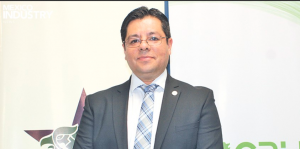
Every day, more companies in Guanajuato and Mexico are integrating sustainability and social responsibility policies, which are not only contributed to environmental care, they have also affected the increase of efficiency and competitiveness, and costs reduction and in the improvement of companies’ image.
“The sustainability subject is a competitiveness issue, inasmuch as companies save water, energy, raw materials, they obtain more profits; by having more profits, they can invest more in activities and that makes them more competitive,” said Sergio Ponce Lopez, director of the United States – Mexico Chamber of Commerce chapter Guanajuato (USMCOC.)
He explained that a company adopting the measures and sustainability strategies can generate an economic saving of 10 % to 18 percent.
“A company can generate economic savings, of their fixed expenses, only by investing and improving the electric and thermal energy system, and the subject of wastes. For example, they will be only paying 82 pesos of the 100 pesos they paid, and those 18 pesos is a profit margin that allows them to continue working generating higher wellness for workers,” he explained.
For the director, some of the advantages companies obtain when integrating sustainability strategies and social responsibilities are: operative costs reduction, productive efficiency increase, legal compliance, improvement of image, improvement before society, global compliance (since some countries have stricter regulations if products or services want to be exported,) and finally, a better work environment is generated for collaborators and their development.
“The entire world is trying to improve because the competition is increasingly higher, if they do not decrease operative costs they will not be competitive and will disappear from the market,” he noted.
In an interview during the sixth International Forum of Sustainability and Social Responsibility, Ponce said that due to the great investment attraction the state of Guanajuato has achieved, has made anchor companies or leaders bring sustainability programs.
For that, he said that the entire supply chain of these big companies, which already were in the area, began adopting measures according to leading companies requiring it.
The arrival of these big companies has been positive, he assured.
“They started to understand that there has to be a careful process of the environment and people and that has been a big and successful step for the State, generating local supply that intrinsically brings sustainability subjects,” he said.
SUCCESS STORIES: KCSM, PIRELLI, AND MICHELIN
Although, the railroad is the most efficient cargo transportation means regarding energy consumption, in Kansas City Southern de Mexico (KCSM) is not only limited to that in environmental care.
Jose Zozata, president and executive representative of KCSM, said the company is committed with a responsibility to environmental protection, its customers and the communities where they have activities.
Zozata noted that adopting sustainability measures in companies translates in economic savings, efficiency increase, competitiveness and safety and in a better work environment for all its employees.
“This subject transfers to all company areas. What we are trying to do in KCSM is for sustainability to be a philosophy of daily acting of the company. How to better use existing resources, how to make them last longer, how to recycle them, how to take care of the environment, to be inherent to everything we do. For me, sustainability must be applied not only at corporate level but also at an individual level,” he said.
KCSM has been implementing measures about the efficient use of natural resources to decrease emissions at minimum, reduce wastes production, avoid pollution and improve energy efficiency.
For example, regarding water care, he said that they are performing hydraulic works in yards and throughout the railroad to preserve it and make better use of this resource; besides, they have wastewaters treatment systems.
Also, they better use their fuel, which helps reducing gas emissions of the greenhouse effect (GHE) to the atmosphere and implemented the use of solar battery chargers to activate signs throughout the railroad system.
According to their Sustainability Report 2017, that year one-ton cargo was moved through 383 miles with only one gallon of fuel average in the United States and Mexico; while transportation through road was of 106 miles. This means, choosing railroad transportation above road transportation in trucks, their customers helped to avoid the release of about 338,000 tons of GHE emissions toward the atmosphere.
“We are also working in less electric energy consumption and the use of new friendly and sustainable technologies, such as solar panels. We are establishing solar panels and today we have more than 300 and we are going for more,” he revealed.
The president said that all these measures go together with competitiveness: “If I reduce this, I reduce costs and by doing it I am increasing competitiveness and speed. When train speed increases competitiveness increases in the entire general industry and of the country by the end of the day.”
He detailed that being a sustainable and more efficient company they could offer their customers and users – for example – more competitive tariffs, which will affect those customers’ competitiveness.
“I will do it more competitive, I will also achieve their products arrive in one piece and good state, this also is sustainability cooperation, as I am going to achieve the transportation of their products is made with less possible pollution. Those are different aspects where the sustainability we perform affects the chain to the industry we serve,” he reasserted.
PIRELLI MEXICO
To transform the supply chain and the production of pneumatics to a more sustainable process, Pirelli Mexico has implemented strategies to be one of the most environmentally friendly companies.
Currently, the tires manufacturer, which has its plant in Guanajuato Inland Port is promoting a circular economy that includes the Government, and the environmental and social environment.
Maureen Kline, vice-president of public affairs and sustainability of Pirelli North America, said that the company is adopting an approach in which raw material used for rubber production, are of natural materials – for example – of trees located in southeast Asia.
“It is about being responsible, understand where the rubber is coming, what to do to avoid deforestation, of not attacking human rights and be committed with society and create a sustainable environment,” she said.
Kline explained that aiming to create a greater positive impact, Pirelli is inside an organism where it groups more tires manufacturers with the mission of generating and implement strategies in favor of sustainability, making a more efficient industry committed with society.
Likewise, the Italian company created a plan to extend the life cycle of tires, avoiding to be disposed of after their useful period.
“We are working with competencies to be used in other things like asphalt, our interest is not to contaminate and we do not want tires to become a waste,” she noted.
Also, they are continuously working with their suppliers to join Pirelli’s mission, to which they exhort their needs, what they are looking for and in turn, they train them to fulfill the parameters required by the industry.
MICHELIN
Being a world-recognized company for their environmental strategies, Michelin has the objective for their plant in Leon, Guanajuato is identified as a tires company that promotes clean production and includes workers in the process.
Claudia Oropeza, manager of standards, regulations and social responsibility of Michelin Mexico, underlined that they are seeking to fulfill the regulations in environmental impact conditions and with the commitments of a more efficient and sustainable production; that is why they are being certified in ISO: 14000 and in turn, they work to participate in state programs and become a leader company taking care of the environment.
Michelin Mexico has developed some action plans for workers to be committed with the company through programs that help internal improvement, the environment and communities nearby the plant.
She explained that collaborators in Queretaro have the objective of offering several volunteer hours to implement improvements in different areas, a situation they want to replicate in Guanajuato, where they will work in the specific axis of social responsibility, education, mobility, sustainability, and support to vulnerable groups.
“Creating action plans to take this industry to a circular economy has been hard because everything has to be transformed and it takes a process,” she explained.
Likewise, Michelin created a campaign to teach the population about the use and care of tires, for their life cycle be higher and also with its collection by the end of their useful life.
This program which is being worked in Queretaro has the support of the private initiative, Government, society and tires distributors which became in collection centers for people taking their tires.
“We would like to replicate it in Guanajuato for any citizen be confident in taking their tires to any distributor regardless which brand are they,” she explained.
BAJIO CLEANER PRODUCTION CENTER
The Bajio Cleaner Production Center (CPLB, by its Spanish initials) is a leader in the implementation of eco-efficiency broadcasting projects and training in sustainable practices and of the creation of value in processes, services, and technical-operative activities.
Sergio Ponce Lopez, director of USMCOC Chapter Guanajuato, this center emerged as of a project between the Inter-American Development Bank (IADB) and the Ministry of the Environment and Natural Resources (SEMARNAT, by its Spanish initials) in 2004.
“USMCOC takes the project and generates a place that helps, through advisory or project implementation, companies to reduce their operative costs, find opportunity areas that allow having a better development of their people, better operative practices and better performance,” he said.
From 2004 to date, they have had more than 300 companies from Mexico and other countries like El Salvador, Colombia, and Panama, which belong to different sectors like chemical, automotive, metal-mechanic and footwear, among others.

